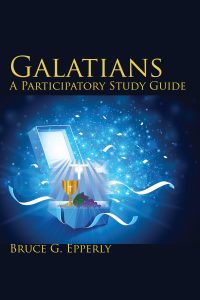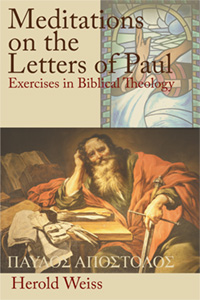Introduction to Perspectives on Paul

I’ll also introduce my approach to the subject. I’ll be working first with material from Energion Publications authors. I publish these materials and I’m acquainted with them. More importantly, I wouldn’t have published them if I didn’t consider them valuable.
You can find all of the materials in our The Apostle Paul category on Energion Direct. Most of these books are available in both print and ebook formats.
 I’m going to use Galatians as my basic guide. That wasn’t my first choice. I’ve often felt that Pauline scholars spend excessive time in Romans and Galatians and neglect books like 1 Corinthians or Philippians in developing their view of Paul’s theology. But I have come to believe instead that what I saw as deficiencies in building a picture of Paul from these letters is more a result of misreading Paul than of choosing the wrong letters. Of course, I will still maintain that in order to understand Paul and his theology, one needs to consult everything he wrote, but I doubt anyone actually disagrees with me on that point. It’s rather a matter of emphasis.
I’m going to use Galatians as my basic guide. That wasn’t my first choice. I’ve often felt that Pauline scholars spend excessive time in Romans and Galatians and neglect books like 1 Corinthians or Philippians in developing their view of Paul’s theology. But I have come to believe instead that what I saw as deficiencies in building a picture of Paul from these letters is more a result of misreading Paul than of choosing the wrong letters. Of course, I will still maintain that in order to understand Paul and his theology, one needs to consult everything he wrote, but I doubt anyone actually disagrees with me on that point. It’s rather a matter of emphasis.
In studying Galatians, I’m going to start from a foundation of reading the book with Bruce Epperly’s study guide in the Participatory Study Series, titled creatively Galatians: A Participatory Study Guide. (The title is not Bruce’s fault. It’s standard for the series, and therefore my fault.) Besides the fact that I publish the book, my reason for choosing this is that it is written by a progressive theologian, also a process theologian, who is nonetheless very favorable to Paul’s writings. I would like to create a conversation here between evangelical and progressive approaches to interpretation and also to take a look at the way our existing theology impacts our reading.
As part of the resources for this study, I’m going to be interviewing scholars from our Energion Publications author list with a variety of perspectives. Because I’m using Bruce Epperly’s study guide, I’m starting by interviewing him. I completed it this morning, and I’m excited by the results and what he had to say. Bruce is always entertaining. He’s the first of several. I hope you will listen to (or watch) all of them. Here’s the video:
 It’s not necessarily a bad thing for our theology to impact our reading. In fact, I think it would be quite shocking if it didn’t. I am only reading the Bible because I grew up in a Christian home and have a theology that suggests that this book is useful. My existing theology is also going to have an impact on the way I place the content of the book. In turn, Paul is himself impacted by his own background and theology. This doesn’t suggest that interaction with the book doesn’t have the potential to change or even totally revolutionize our existing thinking. Paul encountered God in a new and different way on the road to Damascus and his theology was revolutionized. Yet one can still see his background in his destination.
It’s not necessarily a bad thing for our theology to impact our reading. In fact, I think it would be quite shocking if it didn’t. I am only reading the Bible because I grew up in a Christian home and have a theology that suggests that this book is useful. My existing theology is also going to have an impact on the way I place the content of the book. In turn, Paul is himself impacted by his own background and theology. This doesn’t suggest that interaction with the book doesn’t have the potential to change or even totally revolutionize our existing thinking. Paul encountered God in a new and different way on the road to Damascus and his theology was revolutionized. Yet one can still see his background in his destination.
It’s easy to separate Paul from his own background. In fact, it’s easier to do so than not. So I’m going to emphasize the background. Now I’m not in search of some undiscovered country where I hear Paul 100% as he was. My theology will be in tension with his as I learn, and I hope yours will be there as well.
It’s my hope to provide additional video notes and some blog posts each week. Just as we have with the Energion Publications Tuesday Night Hangouts I’ve changed these to a half hour each. I also hope that you will pick up a copy of Bruce Epperly’s book and do a study of Galatians at the same time as I do.
I will be consulting the other books listed, and also providing a resource page with a list of available books. But another book will be with me for the entire study is Herold Weiss’s book Meditations on the Letters of Paul. Herold brings some impressive scholarship to his reading of Paul, and I will be making full use of his material. As a suggestion, pick up copies of both of these books and follow along. And yes, I will be interviewing Herold as part of my series asking “Who was Paul?”
Here’s the viewer for tonight’s presentation:
Note that if you want to participate in live chat you will need to go to my YouTube channel and watch there. I will be watching the live chat for questions and comments. Note that I have put the books involved on sale on Energion Direct. You will be able to see them on the home page.

